French
Working Paper Vol. 13
Based on a sample of job advertisements published in the main Luxembourgish daily newspaper (Luxemburger Wort) covering the period 1984-2019, this study describes the development of language skills required on the Luxembourg job market. After a brief presentation of the linguistic situation and the labor market in Luxembourg, the statistical analysis of a sample of some 8,340 job advertisements constitutes the main part of this publication. A qualitative study of a smaller body of job vacancies sheds additional light and a detailed understanding of linguistic needs in a multilingual and international labor market. Both approaches come to the same conclusion. The labor shortage and particularly the lack of people fluent in the "three languages of the country" has led to a segmentation of the labor market.
Policy Paper Vol. 4
Over the course of the 20th and 21st century, different forms of cross-border cooperation have emerged and developed within the so-called Greater Region. The France Strategy of the Saarland – announced in 2014 – adds upon these existing efforts, aiming in particular to foster functional multilingualism, and cross-border cooperation in the economic, research, and cultural sphere. In this endeavour, both public and private actors are to be included into the process(es) of implementation. The announcement of the Strategy was met with notable response from the French neighbouring territories. In this context, municipalities serve a double role – on the one hand, they act as a ‚mouthpiece‘ for local interests and needs ‚on the ground‘, on the other hand, they themselves engage in and support cross-border cooperation, and serve as intermediaries for regional guidelines. Based upon quantitative and qualitative research with a focus on the local level, the following policy paper presents central recommendations for action regarding the further direction and implementation of the France Strategy, and more generally cross-border cooperation within the cross-border region of the Saarland and the French département Moselle. The recommendations are divided into five areas, touching upon activities related to the fostering of multilingualism, the support and accompaniment of activities, the fostering of netweks, as well as the further institutionalization of cross-border cooperation within the (trinational) border region.
Policy Paper Vol. 3
The purpose of this paper is to contribute to the reflection on the role of training in the cross-border labor market. It does so by mobilizing the debates initiated in the different Cahiers de la Grande Région and during a conference debate organized online on December 1 2020 on the topic of "Inequities, Skills, and Training: What Equations for the Cross-Border Labor Market?” More precisely, this contribution aims at answering the following question: how can training and its different practices in the professional fields, but also in school and university education, mitigate the imbalances that are emerging on the labor market of the Greater Region? The document thus proposes a few lines of thought for cross-border cooperation in the field of training.
Working Paper Vol. 11
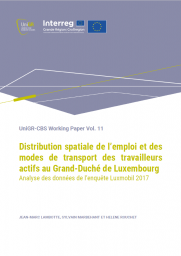
Analysing the database of the Luxmobil 2017 survey, this article presents the main outcomes concerning the spatial distributions of employment and modal choices related to commuting of both resident and cross-border workers within the Grand Duchy of Luxembourg. This analysis highlights the significant disparities regarding these distributions, the predominant car dependency and the required conditions to achieve a high modal share of public transport. Confronted with the challenging European objective of decarbonisation by the year 2050 and considering the national and supra-regional strategic documents, in order to coordinate urban development with the public transport offer, a voluntarist cross-border ‘transit-oriented development’ policy appears to be necessary.
Policy Paper Vol. 2
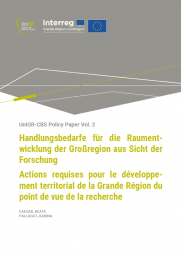
The policy paper 'Action Needs for Spatial Development in the Greater Region from a Research Perspective' summarises key findings of researchers from the UniGR-Center for Border Studies in five areas relevant to the Greater Region (demography and migration, transport, employment and economic development, energy land-scapes, cross-border governance) and formulates options for action for planning practice and political deci-sion-makers. In addition, it addresses the exchange of knowledge between research and politics.
UniGR-CBS Working Paper Vol. 9
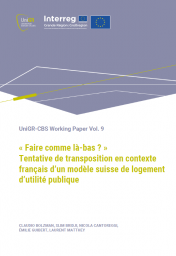
Cross-border regions are often laboratories for the circulation of ideas and practices. This article asks whether, in Greater Geneva region, it is possible to transpose the cooperative housing model, fairly developed in Switzerland, into the French context, where this type of housing is less common. Using the example of Viry, a French municipality located within the institutional perimeter of Greater Geneva, the article analyzes the possibilities and limits of such a transposition. The results show the difficulty in emulating a context specific to reproducing the Swiss model of cooperatives in France. The legislative and institutional differences, but also cultural differences with regard to housing in its various dimensions are all obstacles to reproducing, identically in France, proven methods of construction of cooperative housing in Switzerland. It is therefore necessary to develop creative adaptations of different kinds so that the original model can find a place in the new context.
Borders in Perspective Vol. 4
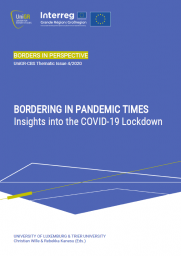
In the course of the COVID-19 pandemic, borders have become relevant (again) in political action and in people's everyday lives within a very short time. This was especially true for the inhabitants of border regions, whose cross-border life worlds were suddenly irritated by closed borders and police controls. However, the COVID-19 pandemic also led to an increased evidence of social, cultural, economic, health and mobility boundaries beyond national borders, which raised pressing questions about social inequalities. The authors shed light on these dynamics from the perspective of territorial borders, social boundaries and (dis)continuities in border regions through a variety of thematic and spatial approaches. The critical observations and scientific comments were made during the lockdown in April and May 2020 and provide insights into the events during the global pandemic.
Working Paper Vol. 7
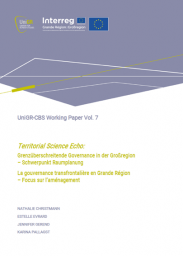
This Territorial Science Echo highlights essential facets of governance that may prove relevant for the future development of the Greater Region. In particular, it shows how thematic cooperation and conflicts contribute to the establishment of governance structures. The paper deals with the topics of governance in general, participation and housing as well as the external relations of the Greater Region, formulates essential challenges and recommendations, and is thus to be understood as a suggestion in the professional discourse for the further design of the spatial development concept of the Greater Region.
Working Paper Vol. 5
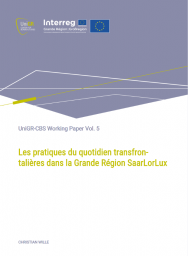
This paper analyses everyday practices carried out by the residents of the Saarland, Lorraine, Luxembourg, Rhineland-Palatinate and Wallonia in the neighbouring regions abroad. The key assumption is the consideration that the inhabitants of the Greater Region SaarLorLux define the transborder reality of life of this region through their cross-border performance of everyday practices. Such a socio-constructivist perspective is not interested in what the Greater Region SaarLorLux actually is, but in what ways it is constituted or how it manifests itself in the daily lives of its inhabitants. Therefor the most common cross-border everyday practices, such as shopping for everyday needs, leisure-time shopping, outdoor recreation/tourism, cultural events, as well as visiting friends and family are looked at in greater detail. These observations are based on selected findings from three recent empirical studies of the study region, which have been linked to each other as well as socio-culturally and socioeconomically mapped in order to carve out the spatial organization, the motives and other contextual factors of cross-border everyday practices in the Greater Region SaarLorLux. This approach allows reconstructing mobility flows and spatial emphases in the context of everyday practices and gives insights into the nature of cross-border living realities in the Greater Region SaarLorLux.
